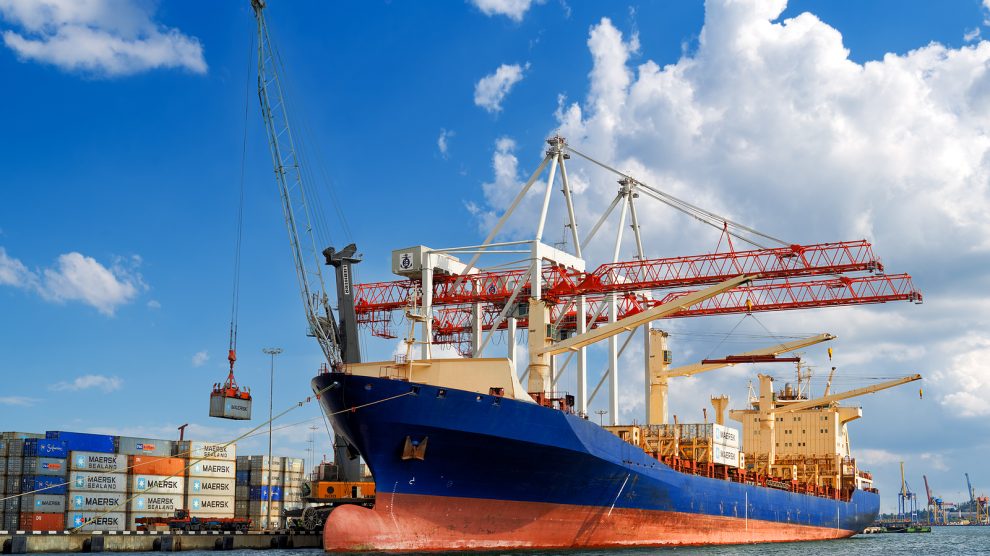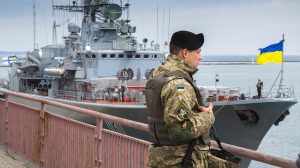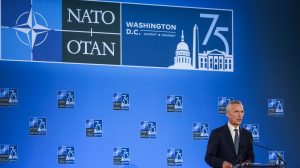You can read all of our coverage of Russia’s invasion of Ukraine, including explainers and articles offering context and background information here.
Russia’s invasion of Ukraine
Ukraine announced on Thursday that it would try to break the Russian naval blockade of Kyiv’s Black Sea ports and restart exports after Moscow withdrew from a UN-brokered agreement that allowed the safe passage of Ukrainian grain.
“Temporary corridors have been announced for merchant vessels going to/from the ports,” Ukraine’s navy said in a statement, adding that there is still a “military threat and mine danger” from Russia along all routes.
Moscow has threatened that it would treat commercial vessels heading to Ukrainian ports as potential military targets.
The move comes after Ukraine conducted successful sea drone strikes on a Russian navy and tanker this month, testing Moscow’s military power in the Black Sea region.
Russia said on Sunday that it shot down a drone heading for Moscow in the third such attack in a week, while officials in both Russia and Ukraine have confirmed Ukraine targeted two bridges linking Crimea to the mainland.
Both countries have stepped up strikes on each other’s troops, weaponry and infrastructure as Kyiv seeks to dislodge Russian forces who have dug in across southern and eastern Ukraine since their invasion of the country last year.
The Moscow-appointed head of Crimea said the Chonhar bridge to the peninsula, which was annexed from Ukraine by Moscow in 2014, had been damaged by a missile strike. Another of the three road links between Crimea and Russian-occupied parts of mainland Ukraine, near the town of Henichesk, was shelled and a civilian driver wounded.
Traffic was halted on a third bridge linking Russia to Crimea after both sides said a Ukrainian naval drone full of explosives struck a Russian fuel tanker overnight last Friday, the second such attack in 24 hours.
European gas traders have begun storing natural gas in Ukraine to take advantage of lower prices and available capacity there, regardless of the risks from the ongoing war, three traders and company officials said this week.
Following Russia’s invasion of Ukraine last year, the European Union has sought high levels of gas storage to compensate for reduced Russian supply, especially during the peak demand winter months.
The bloc is expected to reach a target of filling its storage facilities to 90 per cent full by November 1.
Traders said there was commercial logic in storage in Ukraine, in addition to on EU soil, to take advantage of cheaper prices now versus for future delivery.
Ukraine made a renewed push last weekend at a gathering in Saudi Arabia to win the support of dozens of countries that have remained on the sidelines of the war — the start of a broader campaign in the months ahead to build the diplomatic muscle to isolate and weaken Russia.
Ukraine and Saudi Arabia invited diplomats from some 40 governments to talks in the Red Sea port of Jeddah on Saturday. In addition to the United States and European countries, notable attendees included China, India, Brazil, South Africa and some of the oil-rich Gulf nations that have tried to maintain good relations with both Ukraine and Russia throughout the war.
Many of the countries that have declared their neutrality appear unlikely to shift their stances, though, and some reject the very concept of choosing sides, framing the war as a contest between superpowers that they want no part in.
The co-founder of Russian tech giant Yandex has spoken out against the “barbaric” war in Ukraine, an unusual public criticism from one of the country’s leading businessmen.
“Russia’s invasion of Ukraine is barbaric, and I am categorically against it,” Arkady Volozh said in a statement published on Thursday. “I am horrified about the fate of people in Ukraine — many of them my personal friends and relatives — whose houses are being bombed every day.”
Vladimir Putin’s war has rocked Yandex, Russia’s answer to Google, since the full-scale invasion was launched in February last year. The company has sought to negotiate a complex restructuring with the Kremlin while Volozh and other top executives grappled with the consequences of the war.
Thousands of Yandex’s staff have fled the country, while the company last year hired former Russian finance minister Alexei Kudrin, a longtime confidant of Putin’s, to negotiate a restructuring that would spin off some of its international businesses.

Other news from the region
Poland will send 2,000 troops to its frontier with Belarus, twice the number requested by the Border Guard, amid a surge in the number of migrants and asylum seekers attempting to irregularly cross to stem ill crossings and maintain stability. Poland has already recently boosted its forces on the border following Belarus’s offer to host Wagner Group mercenaries after their short-lived rebellion in Russia and has erected a physical and electronic barrier along the border over the last two years.
Polish President Andrzej Duda announced this week the nation will hold a general election on October 15, officially kicking off campaigning as the nationalist Law and Justice party fights to hold onto power for an unprecedented third term. The contest poses one of the biggest risks yet to Law and Justice’s coalition majority as the opposition assails the government for failing to allay a cost-of-living crisis and resolve a growing list of legal disputes with the European Union that have frozen 35.4 billion euros in aid.
Lithuania declared more than a thousand citizens of Russia and Belarus living in the country to be threats to national security and said it was stripping them of their permanent residency permits. The decision comes after the government asked the Russians and Belarusians to answer a questionnaire that included questions about their views on Russia’s invasion of Ukraine and the status of Crimea, the Ukrainian territory which Russia illegally annexed in 2014.
A pro-European party that pledges to keep Slovakia within the trans-Atlantic fold is emerging as the main contender against the country’s firebrand frontrunner weeks before a crucial election. The September 30 contest may pit former Prime Minister Robert Fico’s Smer, an anti-immigrant party that has attacked European Union sanctions on Russia, against Progressive Slovakia, a party that’s sworn to defend democratic institutions, the rule of law and LGBTQ rights.
The German government has shut down the financing of four infrastructure projects worth 105 million euros in Bosnia and Herzegovina’s Republika Srpska as a sanction against the secessionist aims of the entity’s president, Milorad Dodik. The projects are Republika Srpska’s first wind farm, called Hrgud, as well as two revitalisation projects at the Trebinje hydropower plant and the construction of a wastewater treatment plant in Gradiska. The funding was initially suspended in April 2022 after Dodik moved to pull the Bosnian Serb entity out of state institutions, triggering Bosnia’s gravest political crisis since its 1992-1995 war.
The former chief prosecutor of the International Criminal Court (ICC), Luis Moreno Ocampo, warned that Azerbaijan is preparing genocide against ethnic Armenians in its Nagorno-Karabakh region and called for the United Nations (UN) Security Council to bring the matter before the international tribunal. Ocampo’s report, issued August 8, said Azerbaijan’s blockade of the only road leading from Armenia to Nagorno-Karabakh seriously impedes food, medical supplies and other essentials to the region of about 120,000 people.
Slovenia’s worst floods on record have killed at least six people, swept away homes and clogged villages with debris, authorities and media said on Monday. Heavy rains have lashed about two thirds of the Alpine nation for days, destroying buildings and bridges to cause an estimated 500 million euros ) of damage. Thousands of people have been evacuated from homes around northwest and central Slovenia, with the army, firefighters and rescuers trying to free others and clear streets.
A Greek football fan was stabbed to death during a brawl between supporters of AEK Athens and Croatian club Dinamo Zagreb on Tuesday. Police said nearly 100 people were arrested after the violent clashes, which led European football’s governing body, UEFA, to postpone the Champions League qualifying third-round, first-leg match between the two sides that was due to be played on Tuesday in Greece’s capital.
Unlike many news and information platforms, Emerging Europe is free to read, and always will be. There is no paywall here. We are independent, not affiliated with nor representing any political party or business organisation. We want the very best for emerging Europe, nothing more, nothing less. Your support will help us continue to spread the word about this amazing region.
You can contribute here. Thank you.







Add Comment